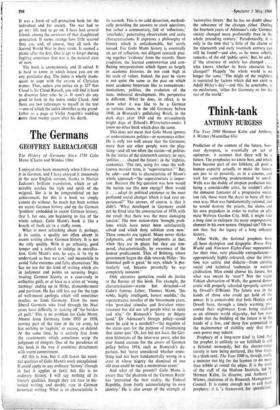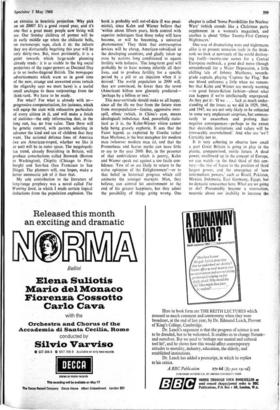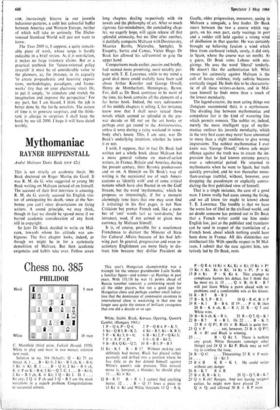Think-tank
ANTHONY BURGESS
The Year 2000 Herman Kahn and Anthony J. Wiener (Macmillan 63s) Prediction of the content of the future, how- ever dystopian, is essentially an act of optimism: it assumes that there will be a future. The prophecies we know best, and which have become part of our folklore, all posit a human capacity actually to make the future, not just to sit passively, as in a cinema, and wait for something predetermined to unroll. Wells was the daddy of utopian prediction but, being a considerable artist, he couldn't allow the innocent fantasies of a progressive social- ism (ah, those were the days) to have all their own way. Man was fundamentally rational, and he would destroy the priests, the slums and his own prejudices in order to realise an ulti- mate Welwyn Garden City. Still, it might take a long time to extirpate the nasty unprogressive element in his own nature. Original sin? Oh no, not that. Say the legacy of a long unhappy history, After Wells, the fictional prophets have all been dystopian and dyspeptic. Brave New World and Nineteen Eighty-Four represented, for their time, very plausible extrapolations-- appropriately highly coloured, since the inten- tion was satiric and didactic—from existing social and technical tendencies in western civilisation. Man could choose his future, but what was meant by 'man'? Not the vague Fabian abstraction of Wells, the general demo- cratic will properly schooled (properly scorned by Orwell's O'Brien). The future was in the hands of those who could get hold of the power. It is conceivable that both Huxley and Orwell have, through a timely warning, pre- vented their nightmares from being realised as an ultimate world oligarchy, but few now doubt that the building of the future is in the hands of a few, and those few committed to the maintenance of stability only that their own power may subsist. Prophecy of a long-term kind (a kind that the prophet is unlikely to see fulfilled) is still a fictional monopoly, but the shorter-range variety is now, being nurtured, like blue trout, in a think-tank: The Year 2000 is, though, really a monster too big for the layman to do more than nibble at round the edges. It is the work of the staff of the Hudson Institute, led by Herman Kahn, its director, and Anthony J. Wiener, chairman of its Research Management Council. It is canny enough not to call itself . prophecy; it is 'a framework for speculation, an exercise in heuristic projection. Why pick on AD 2000? It's a good round year, and it's one that a great many people now living will see. Our Sunday children of protest will be in early middle age when the chiliastic bells, on stereoscopic tape, clash it in; the infants they are distractedly begetting this year will be only thirty-two. But, most pertinently, it is a point towards which - large-scale planning already tends : it is as visible to the big social projectors of the super-powers as Decimal Day is to us twelve-fingered British. The newspaper advertisements which warn us in good time of the new, strange and unwanted coins (which the oligarchy says we must have) is a useful small analogue to these outpourings from the think-tank. We have to be ready.
For what? For what is already with us— progressive computerisation, for instance, which will equip the state with exhaustive particulars of every citizen in it, and will make a fetish of statistics—the only information that, in the long run, has no true value. Then there will be genetic control, with parents selecting in advance the kind and sex of children that they want. The national defence lines of America (we are American-troped, whether we like it or not) will be in outer space. The megalopoli- tan trend, already flourishing in Britain, will produce conurbations called Boswash (Boston to Washington), Chipitts (Chicago to Pitts- burgh) and San-San (San Francisco to San Diego). The planners will, one hopes, make a better onomastic job of it than that.
My sole contribution to the literature of long-range prophecy was a novel called The Wanting Seed, in which I made certain logical deductions from the population explosion. The book is probably well out-of-date (I was pessi- mistic), since Kahn and Wiener believe that 'within about fifteen years, birth control with superior techniques than those today will have become, or will be becoming, a universal phenomenon.' They think that contraceptive devices will be cheap, American-subsidised in the developing countries, and gladly taken up even by nations long conditioned to equate fertility with holiness. The long-term goal will probably be to have women infertile all their lives, and to produce fertility for a specific period by a pill or an injection when it is desired.' The world population in 2000 will, they are convinced, be fewer than the seven (American) billion now gloomily predicted— 'perhaps by a billion or two.'
This near-certitude should make us all happy, since all the -ills we fear from the future stem from overpopulation—famine, aggressive over- spill, ethnic (which, in China's case, means ideological) imbalance. And, powerfully statis- tical as it is, the Kahn-Wiener vision cannot help being gravely euphoric. It sees that the Faust legend, as exploited by Goethe rather than Marlowe, is the best metaphor for modern man (whoever modern man is), and that the Prometheus and Icarus myths can have little to say to the year 2000. But, in the presence of that ambivalence which is poetry, Kahn and Wiener speak out against a too facile con- fidence. 'Few of us are likely to return to the naive optimism of the Enlightenment'—or to that belief in historical progress which still animates the younger marxists. Man, they believe, can control his environment to the end of his greater happiness, but they admit the possibility of things going wrong. One chapter is called 'Some Possibilities for Nuclear Wars' (which sounds like a Christmas party supplement in a woman's magazine), and another is about 'Other Twenty-First Century Nightmares.'
One way of dramatising wars and nightmares alike is to present scenarios (safe in the think- tank we look at newsreels of the world destroy- ing itself)—twenty-one scenes for a Central European outbreak, a good deal more (though unnumbered) for a Major Depression, a little chilling tale of Johnny Matthews, seventh- grade captain, playing 'Capture the Flag.' But our blood unfreezes a little when we remem- ber that Kahn and Wiener are merely warning —in good future-fiction fashion—about what can happen if we're intellectually unprepared. As they put it : 'If we . . . lack as much under- standing of the issues as we did in 1929, 1941, and 1947, we are not only likely to be subjected to some very unpleasant surprises, but unneces- sarily to exacerbate and prolong their negative consequences—perhaps to the extent that desirable institutions and values will be irrevocably overwhelmed.' And who are 'we'? Certainly not us.
It is very sobering to observe how small a part Great Britain is going to play in the plastic, computerised, sterile future. A dead power, swallowed up in the concept of Europe, we can watch—in the final third of this cen- tury—the rise of Japan to the position of third largest power, and the emergence of 'new intermediate powers,' such as Brazil, Pakistan, Mexico, Indonesia, East Germany, Egypt, but no dynastic renascence here. What are we going to do? Presumably become a reservation, neurotic about our inability to increase the GNP, increasingly bizarre in our juvenile behaviour-patterns, a cold but colourful buffer between America and Western Europe, neither of which will take us seriously. The Dicho- tomised Standard World will just not want to know.
The Year 2000 is, I suppose, a quite remark- able piece of work, whose scope is hardly indicable in a brief review. As it is non-fiction, it makes no large visionary claims. But as a practical textbook for 'future-oriented policy research' it must be of considerable value to the planners, as, for instance, in its capacity 'to create propaedeutic and heuristic exposi- tions, methodologies, paradigms, and frame- works' (try that on your electronic sitar). Or, to put it simply, 'to stimulate and stretch the imagination and improve the perspective.' For my part, but I am biased, I think the job is better done by the fut-fic novelists. The nature of time is to generate surprises, and the think- tank is allergic to surprises. I shall keep the book by me till 2000. I hope it will have dated terribly.








































 Previous page
Previous page